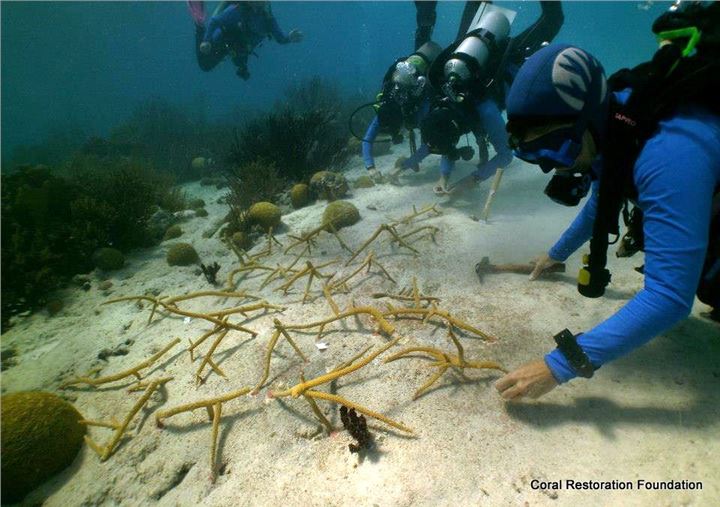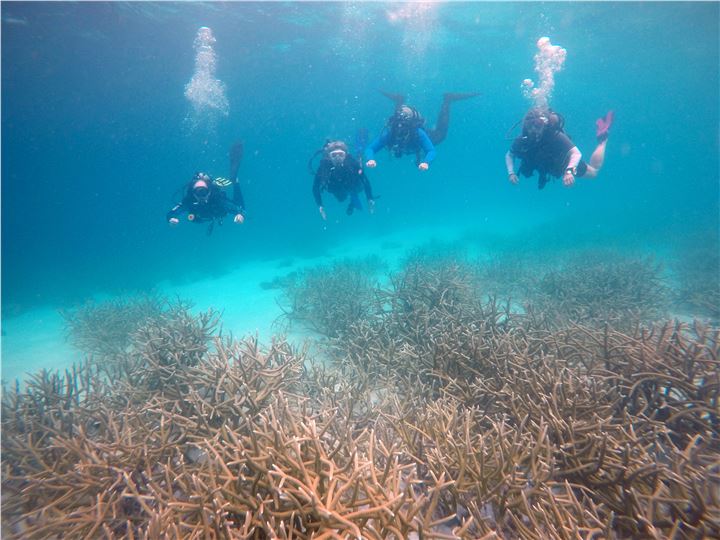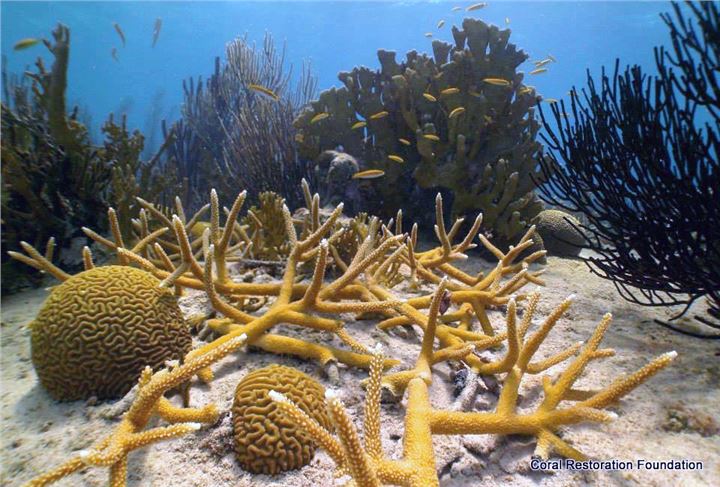Purpose
- Explores and develops market-based solutions.
Summary
This is a community based coral reef restoration project that will take place in Bonaire, Netherlands Antilles. The project has been partially funded by the Alex C. Walker Foundation, and by resort fees from the host resort in Bonaire. This ongoing project seeks to expand an existing coral nursery and restoration program to involve multiple resorts on the island. In 2012 and 2013 the staff from the Coral Restoration Foundation, Inc (CRF) worked with members of an affiliated nonprofit on Bonaire called the Coral Restoration Foundation, Bonaire (CRFB) to develop an offshore coral nursery and coral restoration program off the islands of Bonaire and Klein Bonaire. Two offshore, in situ coral nurseries have been set up and stocked with locally collected corals, and the nurseries are now to the point where each month hundreds of second and third generation corals are being transplanted onto the local reefs of Bonaire and Klein Bonaire by supervised groups of tourist volunteers

Outplanting staghorn off of Kline Bonaire
Description
The Coral Restoration Foundation Bonaire (CRFB) experienced a land mark year for coral restoration in 2014. During the first week in December 2014, a group of staff, volunteers, and board members from CRF USA traveled to Bonaire to help CRFB in all facets of nursery maintenance, construction of nursery structures, and in outplanting nursery-raised coral back to the reef. During the visit the CRF team was able to share new nursery and outplanting techniques, support existing restoration programs, and establish new partnerships within the island community.
Since 2012, CRF USA has worked with the team at Buddy Dive Resort and CRFB to build a long term coral restoration program on the island. The initial work consisted of setting up two offshore coral nurseries to propagate and grow endangered staghorn and elkhorn corals (Acropora cervicornis and Acropora palmata) that could be used to restore the shallow reefs around Bonaire and Klein Bonaire. By the middle of 2014, 50 coral tree nursery structures were in place at the two nursery sites, with a combined inventory of about 8,000 corals.
Reef restoration efforts using nursery raised corals began in the summer of 2013 and continue on a weekly basis. CRF USA staff and volunteers have traveled to the island several times in 2013 and 2014 to train CRFB staff on outplanting techniques, and to help move corals out of the nurseries to selected reef sites. Several thousand nursery-raised corals have been planted on various reefs around Bonaire and Klein Bonaire since June of 2013. Supported by a team of dive shops, local volunteers, and tourist volunteers, outplanting efforts continue on a weekly basis.
Also, in June 2014 a small team of CRF board members met with the management of CRFB to discuss ways to expand the program on the island of Bonaire (and beyond). The main focus for the discussions were how to add new resorts and dive shops to the CRFB program, how to pay for the program, and how to help the program become financially self-sufficient. A draft intra-island agreement was reviewed and approved, and in the fall of 2014 the first new team member was added to the CRFB “network”. Harbour Village, is the new member of CRFB and their staff has been actively participating in the program with Buddy Dive. During the December 2014 CRF USA trip, a new house nursery was installed off the beach in front of Harbour Village. Plans are underway to add additional resorts and house nurseries in the spring and summer of 2015.
Our assessment of the program in Bonaire is that it has been a big success! The goal was to develop a long term, self-sustaining coral reef restoration program on the island, and with the help of funding from the Alex C. Walker Foundation, that has been done. There are now multiple resorts on the island that are working together to solve a common environmental problem. They are creatively using passive user fees, tourism fees, merchandise sales, direct donations, and dive specialty certification fees to fund the program. CRF will continue to provide assistance and mentoring to the CRFB team, but they are clearly embracing the program and finding ways to support it. An international membership program is being developed by CRF International which will provide long term support and mentorship to affiliates such as CRFB.
CRF USA and CRFB appreciate the support and encouragement they have received from the Walker Foundation. The support came at a critical time in the development of this program, and although the job of restoring coral reefs in Bonaire is far from done, the job of setting up a mechanism to do so has been accomplished.

2018 Walker family follow-up visit to one of the coral restoration sites showing extensive recovery of out-planted staghorn coral. The visit was funded personally, not by the Foundation.

Established cluster of staghorn coral off Klein Bonaire
Purpose
The Coral Restoration Foundation (CRF) has identified an underutilized group of willing volunteers and donors (the recreational SCUBA diving community) and has developed a system that trains and engages them in helping with all aspects of coral nursery development, coral reef restoration, and restoration site management. Working with resorts in the Florida Keys and Bonaire, CRF has developed a suite of revenue generating options that when implemented can financially support the ongoing costs of managing a coral nursery and restoration programs. CRF is also working with the Bonaire Marine Park to explore ways that a portion of the mandatory park user fees can be diverted to help support the island-wide coral restoration effort.
Scope
This is the final phase of a three phase international project designed to develop a model for a sustainable coral reef restoration program. The project is taking place in Bonaire, a small Dutch island in the southern Caribbean. The first two phases of the project have already gained international attention, and the model developed at the completion of this project, and the lessons learned from it are helping to develop a more robust, Caribbean-wide program.
Coral reefs provide critical fish habitat, help control coastal erosion, provide sand for beaches, and provide enormous economic benefits through the ecosystem services they provide and enhance. Protecting and restoring the health and diversity of coral reefs should be a national economic priority for the United States as well as all the countries of the world bordered by coral reefs.
Amount Approved$10,000.00
on 6/10/2014
(Check sent: 7/10/2014)